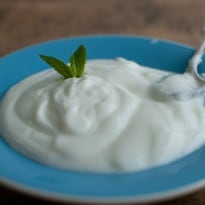A good natural yoghurt is one of life's simplest, yet most pleasing foods; the chalky creaminess cut by its clean, refreshing, mild acidity. Throughout the Middle East and France, more jellied "set" yoghurt gets the thumbs up. In the UK, a slacker, creamier consistency seems to be the majority preference. Nuances among yoghurts made with different milks are interesting - snowy-white goat's milk, sharper sheep's milk yoghurt, and buffalo milk yoghurt, which tastes like a richer version of the standard cow's milk. Taste differences among brands are marked too.
Our shelves are loaded with low-fat yoghurts, but full-fat will always win out for its superior flavour and texture. Low-fat yoghurts often have starches, gums, even gelatine added to improve the texture once the fat is removed.
Why is yoghurt good for me?
The health benefits of the lactic bacteria in yoghurt are well known. These include immune system support; less constipation, stomach acidity and diarrhoea; lower body fat; protection against food poisoning bugs; stronger bones and fresher breath. A highly nutritious food, providing appetite-satisfying protein, and a clutch of vitamins and minerals, unsweetened yoghurt makes an extremely healthy snack. Don't pour off the whey liquid that separates from the milk solids - it's full of protein. Organic milk is more nutritious than the non-organic equivalent.
Where to buy and what to pay
Check out farmers' markets and health food stores for smaller brands, such as Guild of Fine Food award winner Marybelle, from Suffolk, or Brown Cow organic from Somerset. Guide price: £1.75-£2.20 per 450g.
Joanna Blythman is the author of What To Eat (Fourth Estate, £9.99). To order a copy for £7.99 with free UK p&p, go to guardianbookshop.co.uk
Yoghurt cake
This very simple cake is an ideal accompaniment to all the September fruit - like blackberries, plums and figs. Ice with some yoghurt thickened with icing sugar and scattered with fruit, or serve alongside some stewed or baked fruit.
150g yoghurt
1½ tbsp sunflower oil
1 orange, juiced and zested
125g caster sugar
3 free-range eggs
200g plain flour
2 tsp baking powder
1 Preheat the oven to 170C/340F/gas mark 3-4, and butter and line a 500g loaf tin.
2 Beat together the yoghurt, sunflower oil, orange zest and the sugar until the mixture is smooth and light.
3 Beat the eggs together and gradually add them to the yoghurt mix. When you have a light moussey consistency you can then sift in the flour and baking powder.
4 Fold gently until the mixture is just amalgamated and then pour it into the prepared tin: don't over mix or you will have a heavy cake.
5 Bake for 45 mins until an inserted knife comes out clean. Let the cake cool in the tin for about 10 minutes and make a few small holes in the top. Pour the orange juice over the cake. When it is cool, lift out of the tin.
Rosie Sykes is head chef of Fitzbillies and co-author of The Kitchen Revolution (Ebury Press, £25). To order a copy for £19.99 with free UK p&p, go to guardianbookshop.co.uk
In Picture: Yoghurt contains lots of 'healthy bacteria' that look after your gut - and it tastes good. Photograph: Tricia de Courcy Ling for the Guardian








